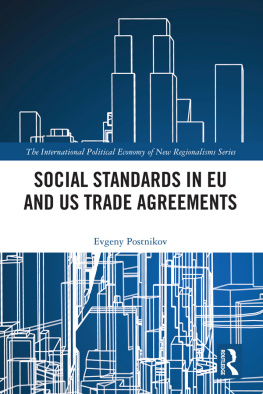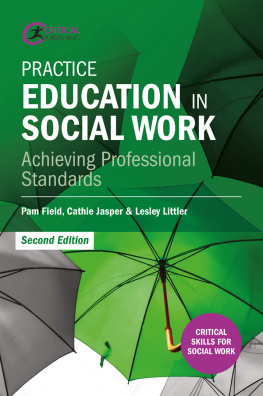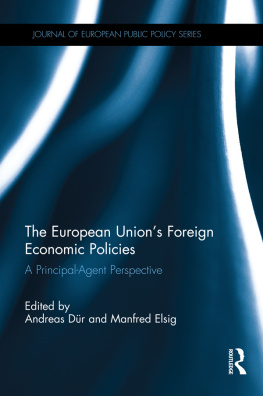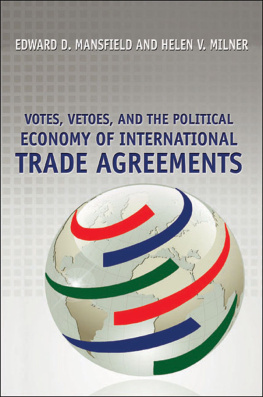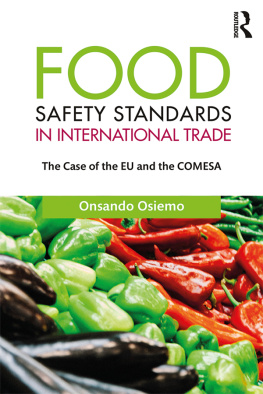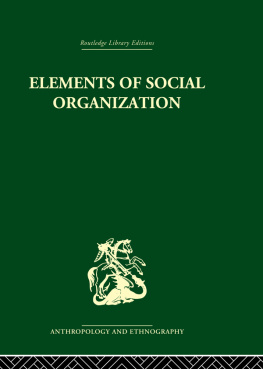Challenging conventional wisdoms, Postnikov persuasively argues how and why the US has stricter social standards than the EU in the design of preferential trade agreements. This book should be required reading for those convinced that globalization leads to a race to the bottom. Postnikov unveils how institutional factors and interest groups determine variation in labor and environmental standards in the global economy. Theoretically and empirically rich, Postnikovs book makes a major contribution to research on social standards in both developed and developing economies.
Nita Rudra, Professor, Georgetown University, USA
Evgeny Postnikov has written an empirically rich and engaging account of the design of labour and environmental standard clauses in EU and US bilateral trade agreements. I also warmly recommended the book to those seeking insights into the inter-institutional dynamics of EU and US trade negotiations.
Johan Adriaensen, Assistant Professor, Maastricht University, Netherlands
Social Standards in EU and US Trade Agreements
This book examines the causes and consequences of social standards in US and EU preferential trade agreements (PTAs).
PTAs are the new reality of the global trading system. Pursued by both developed and developing countries, they increasingly incorporate labor and environmental issues to prevent a race to the bottom in social regulation and counter-protectionism. Using principal-agent theory to explore why US PTAs have stricter social standards than those signed by the EU, Postnikov argues that the level of institutional insulation of trade policy executives from interest groups and legislators determines the design of social standards. In the EU, where institutional insulation is high, social standards mirror the normative preferences of the European Commission leading to a softer approach. In the US, where such insulation is low, social standards are driven by interest groups and legislators they control, resulting in a stricter approach. This book shows that both approaches can be effective but work through different causal mechanisms. To test his argument, Postnikov draws on original data collected in Brussels, Washington, Santiago, Bogota, and Seoul.
This book will be of interest to all scholars and students working in the fields of international political economy and EU and US trade policy.
Evgeny Postnikov is a lecturer in international relations in the School of Social and Political Sciences at the University of Melbourne, Australia. His research interests center on international political economy, especially trade policy and its links with non-trade issues, such as labor rights and the environment. He is particularly interested in the rise of bilateralism in global trade and the role the EU and others play in it. His work has been published in several leading outlets, including the Review of International Organizations, Journal of European Public Policy, Environmental Politics, New Political Economy, and Journal of Common Market Studies.
The International Political Economy of New Regionalisms Series
Series Editor: Timothy M. Shaw
The International Political Economy of New Regionalisms Series presents innovative analyses of a range of novel regional relations and institutions. Going beyond established, formal, interstate economic organizations, this essential series provides informed interdisciplinary and international research and debate about myriad heterogeneous intermediate-level interactions. Reflective of its cosmopolitan and creative orientation, this series is developed by an international editorial team of established and emerging scholars in both the South and North. It reinforces ongoing networks of analysts in both academia and think-tanks, as well as international agencies concerned with micro-, meso-, and macro-level regionalisms.
Multipolarization, South-South Cooperation, and the Rise of Post-Hegemonic Governance
Efe Can Grcan
Inclusive Trade in Africa
The African Continental Free Trade Area in Comparative Perspective
Edited by David Luke and Jamie MacLeod
The Political Economy of New Regionalisms in the Pacific Rim
Edited by Jos Briceo Ruiz and Philippe De Lombaerde
Governing Complexity in the Arctic Region
Mathieu Landriault, Andrew Chater, Elana Wilson Rowe and P. Whitney Lackenbauer
Social Standards in EU and US Trade Agreements
Evgeny Postnikov
For more information about this series, please visit: www.routledge.com/The-International-Political-Economy-of-New-Regionalisms-Series/book-series/ASHSER1146
First published 2020
by Routledge
2 Park Square, Milton Park, Abingdon, Oxon OX14 4RN
and by Routledge
52 Vanderbilt Avenue, New York, NY 10017
Routledge is an imprint of the Taylor & Francis Group, an informa business
2020 Evgeny Postnikov
The right of Evgeny Postnikov to be identified as author of this work has been asserted by him in accordance with sections 77 and 78 of the Copyright, Designs and Patents Act 1988.
All rights reserved. No part of this book may be reprinted or reproduced or utilised in any form or by any electronic, mechanical, or other means, now known or hereafter invented, including photocopying and recording, or in any information storage or retrieval system, without permission in writing from the publishers.
Trademark notice: Product or corporate names may be trademarks or registered trademarks, and are used only for identification and explanation without intent to infringe.
British Library Cataloguing-in-Publication Data
A catalogue record for this book is available from the British Library
Library of Congress Cataloging-in-Publication Data
A catalog record for this book has been requested
ISBN: 978-1-138-07952-6 (hbk)
ISBN: 978-1-315-11432-3 (ebk)
Typeset in Times New Roman
by Apex CoVantage, LLC
I owe much gratitude to many individuals and organizations across the world who have helped me bring this manuscript to fruition. First and foremost, I would like to thank my doctoral program advisor, Martin Staniland, at the University of Pittsburgh, whose scrupulous approach enabled me to think carefully about my ideas and the value of my work. Despite his extremely busy schedule, Martin proved to be a great colleague who was always willing to discuss my thoughts, even when they were not fully fledged. He never doubted the scope of this project, for which I am especially grateful. In Pittsburgh, I also benefitted greatly from the guidance of Nita Rudra and Alberta Sbragia, who made me think critically about my theory and empirics. Their practical advice about research and writing was invaluable.
Writing this book has not only tested my research skills but also my project management and even detective skills needed to conduct research in such diverse cultural and institutional settings, and I would not have succeeded without help from various friends and colleagues. Carolyn Ban introduced me to the basics of interviewing policy-makers in the European Union (EU) and helped me organize my research stay in Brussels. Youri Devuyst proved to be a great local host at the Institute for European Studies at Vrije Universiteit Brussel, where I was a research affiliate in the summer of 2012. Jessica Hatherill provided me with a much-needed workspace in Washington, D.C., in the spring of 2013. Harrison Grafos helped me with the final section of fieldwork in D.C. in the spring of 2017. I would also like to thank Rossana Castiglioni, Jorge Gordn, and Beatriz Hernandez from

